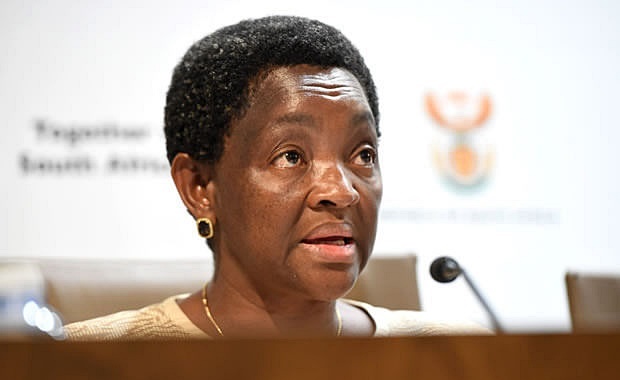
Strictly speaking, there is nothing in the Constitution that prevents controversial ANC MPs like Bathabile Dlamini from being elected to Parliament. This is a problem, writes Mpumelelo Mkhabela.
The nomination of Bathabile Dlamini, Nomvula Mokonyane, Malusi Gigaba and Mosebenzi Zwane to return to Parliament, and possibly Cabinet, after the 2019 elections has justifiably sparked public outrage.
However understandable the outcry from a governance and moral perspective, it is not entirely helpful. It focuses on how the four conducted themselves while holding positions of authority in government rather than the system that makes it possible for them to remain in power.
FIRST TAKE: Inclusion of four dodgy cadres on ANC list shows depth of Ramaphosa's task
When she was minister of social development, Dlamini lied under oath in her court battle with bureaucrats. She wanted to keep the social grants payment contract in the hands of Cash Paymaster Services. Mokonyane, while she was a member of the Gauteng executive, allegedly received bribes from the kingpin of fraudulent tenders, Gavin Watson.
Zwane is a well-known Gupta poodle. Whatever the Guptas wanted, he delivered. They had facilitated his appointment to Cabinet, according to the Gupta Leaks. Gigaba flouted the rules of the department of home affairs to fast-track the Guptas' visas and during his time as minister of public enterprises state-owned enterprises were opened up to rentseekers.
But, strictly speaking, there is nothing in the Constitution that prevents the four controversial ANC MPs from being elected to Parliament. Nor is there anything in the Constitution that prevents them from being appointed ministers again once they have become MPs.
The problem with the current national debate about the four ministers is that it focuses on them as individuals; not the system that allows individuals like them to rise to the top regardless of public opprobrium. The supreme law of the land, the Constitution, only prohibits people declared by a court to be of unsound mind, those who have been sequestrated and those sentenced to more than 12 months in prison without the option of a fine.
Anyone who is not constrained by these limits has a constitutional right to be elected to Parliament and, at the discretion of the president, elevated to Cabinet. Since there is no other law above the Constitution, nothing prevents their reelection unless their party fails to secure the number of seats that would enable it to field them in the legislature.
If the ANC believes that the public condemnation might cost it votes, it can still remove them. The reason the candidate lists are submitted prior to the election is precisely to enable to public to comment about them and to raise objections. From a strictly legal perspective, the objections that carry weight are those related to the constitutional constraints mentioned.
Another factor that can prevent candidates to get seats in the National Assembly is if their respective political parties, through public objections, become suddenly enlightened about something they care deeply about regarding the character of their candidates. This could presumably be something the party was not aware of prior to the publication of the names.
The latter reason for withdrawing a candidate could be based purely on political calculation and internal party qualification mechanisms – if they exist.
WATCH: Magashule reveals ANC's top 10 list - it only has 3 women on it and Zuma declined
In some instances, a candidate might be valued because they bring about internal party cohesion even if this comes at the expense of general electoral support. In compiling their candidates, political parties also communicate a message to voters about what they value most: internal unity among their own members and factions or matters of public concerns. In most cases the two are mutually exclusive.
In some instances, which I think applies to Dlamini, Mokonyane and Zwane, the ANC believes that its popularity outweighs the public unpopularity of the four candidates. Including them on the list helps party president Cyril Ramaphosa to mitigate against internal party accusations that he is out to get his political opponents. But this consideration is incompatible with his "new dawn" that has raised public expectations about the character of ANC candidates under his leadership.
The ANC might have calculated that the public outrage will not translate into a loss of votes. The other consideration – a highly improbable one – is that the four candidates possess unique skills which cannot be found anywhere else in the ANC. Party members looked around and concluded that Dlamini, Mokonyane, Gigaba and Zwane are among the best available candidates. To invoke WB Yeats, could it be that the best in the ANC lack all conviction, while the worst are full of passionate intensity?
If the public outrage has to have any meaningful outcome it must not target individual candidates, but rather the system that allows people like them to rise to the higher public office. That system is supported by the Constitution. The Constitution must be amended to strengthen the qualification criteria to include ethical considerations.
The ongoing criticism of Dlamini, Mokonyane, Gigaba and Zwane is reminiscent of the criticism against Zuma when he was a formidable wrecker of state institutions. We spent too much time criticising him and failed to remedy the constitutional loopholes that made it possible for someone like him to rise to the highest level of state power in the first place.
We haven't addressed the issue. Parliament had to be instructed by the Constitutional Court to create mechanisms to give effect to the impeachment process envisaged in the Constitution. That deals with just one part of the problem – which is the tail end of a crisis.
Society has failed to put pressure on Parliament to strengthen the constitutional requirements to be a Member of Parliament or to be the president. Opposition parties have not campaigned for this either because they know some among their leaders would fail the ethical qualification.
South Africa remains vulnerable to a terrible president because we have failed to institute mechanisms that an aspirant president should go through to demonstrate they are worthy of the position. We have a free-for-all system dominated by one major consideration: popularity. The constitutional provisions that enable Dlamini, Mokonyane, Gigaba and Zwane to return to Parliament are the very same provisions that make it easy for someone like Zuma to become president in future. Nothing has changed.
In fact, a strict interpretation of the constitutional provisions makes it possible for Gigaba or Dlamini or Mokonyane or Zwane to be elected president of the republic by the National Assembly. All that is required, after you have qualified as a MP, having passed those narrow limitations, is to secure the majority of votes in the National Assembly.
Instead of focusing on the personalities like Gigaba, Dlamini, Mokonyane and Zwane, let's look at the Constitution and insist on amendments to systematically restrict people we believe are not worthy of public office.
There should be a national conversation about the kind of MPs, ministers and president we want. The outcome of the conversation must be a system that is thoroughly institutionalised, not personalised.
- Mkhabela is a regular columnist for News24.
Disclaimer: News24 encourages freedom of speech and the expression of diverse views. The views of columnists published on News24 are therefore their own and do not necessarily represent the views of News24.




 Publications
Publications
 Partners
Partners























